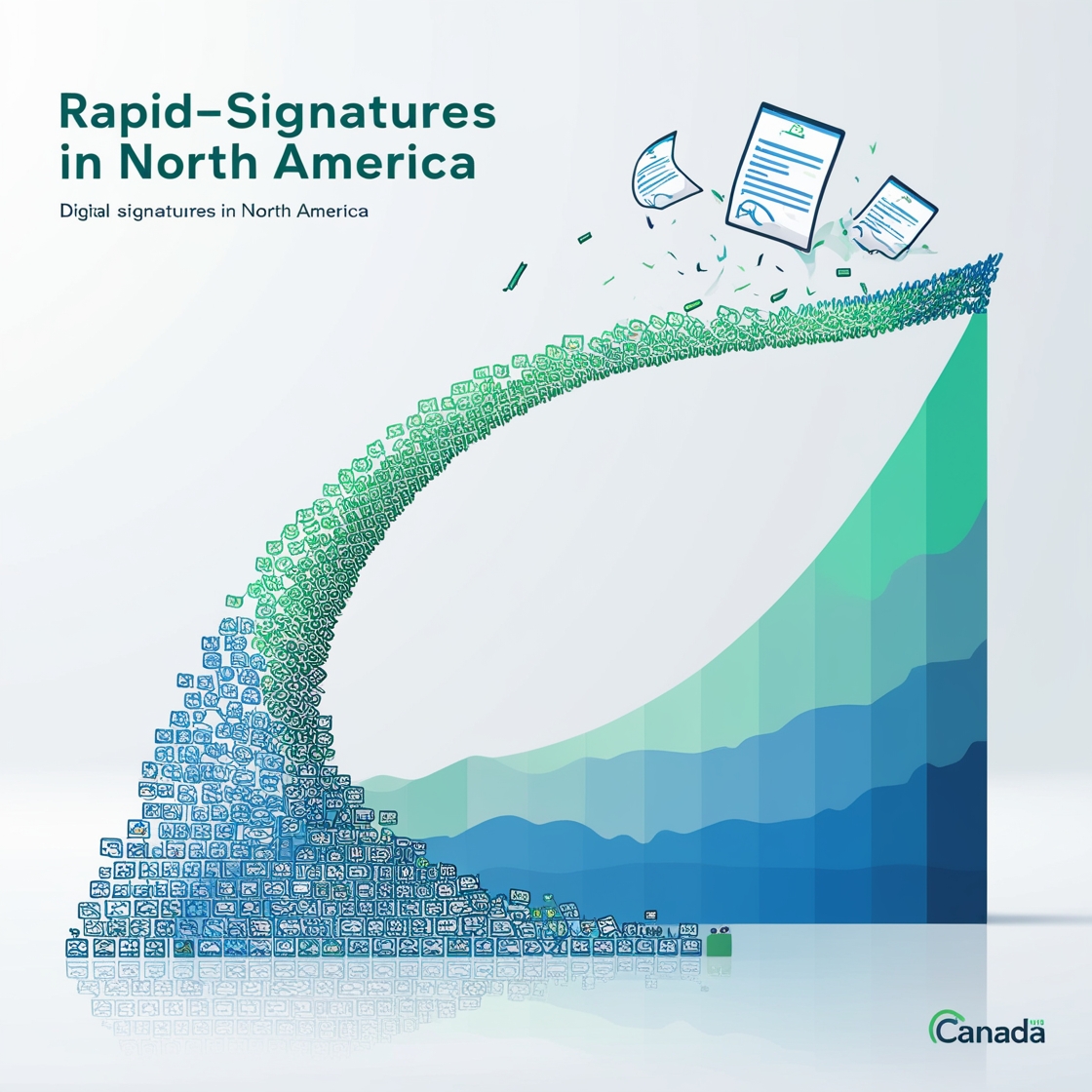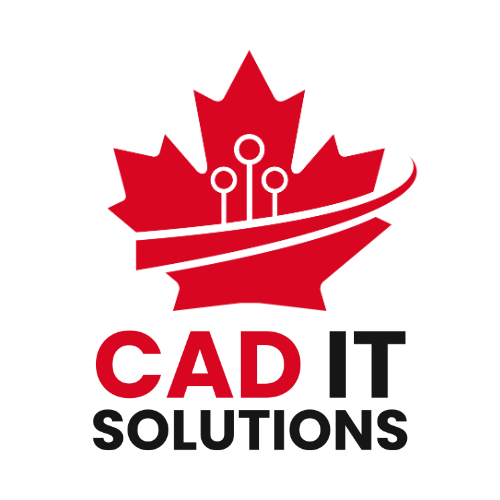The Growing Adoption of E-Signatures in the USA and Canada: Transforming Digital Transactions
- Date : 16-Oct-2024
- Added By : CAD IT Solutions
- Reading Time : 21 Minutes

In today’s fast-paced digital landscape, businesses in the USA and Canada are quickly embracing e-signatures, electronic signatures, and digital signatures to enhance transactions and ensure legal validity. These technologies have made a significant impact across various industries, including real estate, finance, healthcare, and government services. Whether you’re handling contracts, authorizations, or formal agreements, e-signatures provide a smooth, secure, and cost-effective alternative that removes the need for physical paperwork and in-person meetings. This blog will delve into the development of e-signatures, electronic signatures, and digital signatures, their significance in the USA and Canada, and how they help create a more efficient, paperless environment.
What Are E-Signatures, Electronic Signatures, and Digital Signatures?
At first glance, terms like e-signature, electronic signature, and digital signature might appear to be the same. However, each has distinct meanings and uses, particularly in legal and regulatory frameworks.
- E-signature (Electronic Signature): An e-signature refers to any electronic process or symbol that signifies a person’s intention to sign a document electronically. Essentially, it serves as the digital equivalent of a handwritten signature. E-signatures are commonly utilized in the USA and Canada for business transactions, legal agreements, and government activities.
- Electronic Signature: Although often used interchangeably with e-signatures, electronic signatures can include a wider array of technologies. An electronic signature might be as straightforward as typing a name at the end of an email or clicking an “I agree” button on a digital contract. It is legally recognized in both the USA and Canada as a valid method of agreement, as long as it meets the criteria set by the respective e-signature laws.
- Digital Signature: Digital signatures are a specific type of electronic signature that offer enhanced security through the use of cryptographic algorithms to confirm the identity of the signer. They add an important layer of protection by ensuring that the document remains unchanged after it has been signed. In industries such as finance, government, and healthcare in both the USA and Canada, digital signatures play a vital role in upholding trust and integrity in transactions.
The Legal Framework for E-Signatures in the USA and Canada
The legal frameworks that support e-signatures, electronic signatures, and digital signatures in the USA and Canada have facilitated their widespread use across various sectors. The two key pieces of legislation are the ESIGN Act in the USA and the Personal Information Protection and Electronic Documents Act (PIPEDA) in Canada. These laws confirm that electronically signed documents are legally valid, as long as specific conditions are satisfied.
E-Signature Legislation in the USA
In the USA, the Electronic Signatures in Global and National Commerce Act (ESIGN Act), which was enacted in 2000, established the groundwork for the legal recognition of electronic signatures. The ESIGN Act permits contracts and documents signed electronically to hold the same legal weight as those signed on paper. For an electronic signature to be considered valid under the ESIGN Act, the following key conditions must be met:
- All parties must consent to the use of electronic signatures.
- The identity of the signer must be clearly established.
- The electronic signature must be linked to the document being signed.
- The signature must be stored in a format that is accessible to all parties.
E-Signature Legislation in Canada
Canada’s equivalent of the ESIGN Act is the Personal Information Protection and Electronic Documents Act (PIPEDA), which recognizes the validity of electronic signatures. Additionally, the Uniform Electronic Commerce Act (UECA) provides a consistent framework for acknowledging electronic documents and signatures across Canadian provinces and territories. While each province may have its own additional guidelines, PIPEDA ensures that electronic documents and signatures are legally enforceable as long as certain requirements are met:
- The parties involved must agree to use electronic signatures.
- The integrity of the document must be maintained.
- The electronic signature must be reliably linked to the signer.
These legal frameworks have allowed businesses and individuals in both countries to confidently adopt e-signatures, knowing they carry the same legal weight as traditional handwritten signatures.
The Benefits of E-Signatures in the USA and Canada
Using e-signatures, electronic signatures, and digital signatures in the USA and Canada provides numerous benefits, making them a popular choice for both businesses and individuals. Here are some of the most notable advantages.
- Speed and Convenience
In the past, getting a signature required scheduling in-person meetings, printing documents, and mailing them back and forth. Now, with e-signatures, you can sign documents from anywhere at any time. In the USA and Canada, businesses can speed up the signing process by simply sending documents through secure electronic platforms, allowing signers to review and sign within minutes. This convenience is especially beneficial for international deals or parties located in different cities or time zones. - Cost Reduction
Printing, mailing, and storing paper documents can add up to significant costs over time, especially for businesses handling a high volume of transactions. By adopting electronic signatures, organizations in the USA and Canada can greatly reduce operational expenses associated with paper, postage, and storage. Additionally, digital signature solutions often work seamlessly with cloud storage systems, making document retrieval straightforward without the need for physical filing cabinets. - Enhanced Security
Digital signatures offer improved security through encryption technologies, which help ensure the authenticity and integrity of signed documents. Unlike traditional signatures that can be easily forged or altered, digital signatures confirm the signer’s identity and notify all parties if any changes occur after signing. This level of security is vital in sensitive industries such as healthcare, finance, and government, where protecting personal and financial data is essential. - Legal Compliance and Enforceability
Supported by laws like the ESIGN Act in the USA and PIPEDA in Canada, e-signatures are legally recognized and enforceable. Whether it’s a contract, agreement, or consent form, electronically signed documents can be upheld in court if they meet the necessary legal standards. The consistent legal framework in both countries reassures businesses and individuals that e-signatures hold the same validity as traditional signatures. - Environmentally Friendly
E-signatures also promote sustainability by minimizing paper consumption. Organizations in the USA and Canada are increasingly embracing e-signature solutions as part of their commitment to environmental responsibility. By going paperless, businesses can lower their carbon footprint and contribute to a healthier planet.
Industry-Specific Use Cases in the USA and Canada
E-signatures, electronic signatures, and digital signatures are being utilized across various industries in the USA and Canada. Here are a few key sectors where these technologies are making a notable difference.
- Real Estate
The real estate sector in both the USA and Canada has embraced e-signature solutions widely. Realtors and property managers utilize e-signatures to speed up the signing of contracts, leases, and disclosures. In the competitive housing markets of cities like Toronto, Vancouver, New York, and Los Angeles, the ability to close deals quickly can be crucial. E-signatures allow buyers, sellers, and realtors to sign agreements remotely, saving time and facilitating faster closings. - Healthcare
In the healthcare industry, where privacy and security are essential, digital signatures are vital. Healthcare providers in both the USA and Canada use digital signatures to authenticate patient records, consent forms, and prescriptions. Implementing e-signatures in healthcare not only ensures compliance with privacy regulations like HIPAA (Health Insurance Portability and Accountability Act) in the USA and PIPEDA in Canada but also enhances patient care by enabling quicker document processing. - Financial Services
Banks, credit unions, and other financial institutions in the USA and Canada heavily depend on e-signature solutions to handle contracts, loan agreements, and various financial transactions. The secure nature of digital signatures is especially important in this sector, where verifying clients’ identities is crucial to preventing fraud. With e-signatures, financial institutions can also improve customer experience by offering a fast, seamless way to open accounts, sign loan agreements, and approve transactions. - Government Services
Governments in the USA and Canada are increasingly adopting e-signature solutions to enhance efficiency and streamline public services. From tax forms to permits and licenses, many government agencies have incorporated electronic signatures into their processes, enabling citizens to complete transactions online without needing to visit a physical office. This is particularly advantageous in remote areas, where access to government services can be limited. - Legal Sector
Electronic signatures have become crucial for handling contracts, court documents, and client agreements in the legal sector. Lawyers in the USA and Canada can now utilize e-signatures to sign documents swiftly, minimizing delays and enhancing client service. Furthermore, digital signatures guarantee that legal documents retain their integrity and cannot be modified after signing, which is vital for upholding the legality and enforceability of contracts.
The Future of E-Signatures in the USA and Canada
As technology continues to advance, the applications of e-signatures, electronic signatures, and digital signatures in both the USA and Canada will also evolve. The COVID-19 pandemic hastened the adoption of digital tools across various industries, making e-signatures a permanent aspect of how businesses and governments function. With remote work becoming more common and global transactions on the rise, the demand for e-signature solutions is expected to increase.
We can anticipate further innovations in e-signature technology, such as the integration of biometric verification and AI-driven identity checks to bolster security. Additionally, as blockchain technology becomes more popular, digital signatures may develop to incorporate decentralized systems, providing even greater security and transparency.
Conclusion
E-signatures, electronic signatures, and digital signatures have transformed how businesses and individuals in the USA and Canada carry out transactions. By offering a quick, secure, and cost-effective alternative to traditional signatures, these technologies have become essential across various sectors, including real estate, finance, healthcare, and government services. With strong legal frameworks and continuous advancements in digital technology, the future of e-signatures in North America appears bright. Whether you’re a small business owner or part of a large corporation, adopting e-signature solutions can help you remain competitive in the rapidly changing digital landscape.
